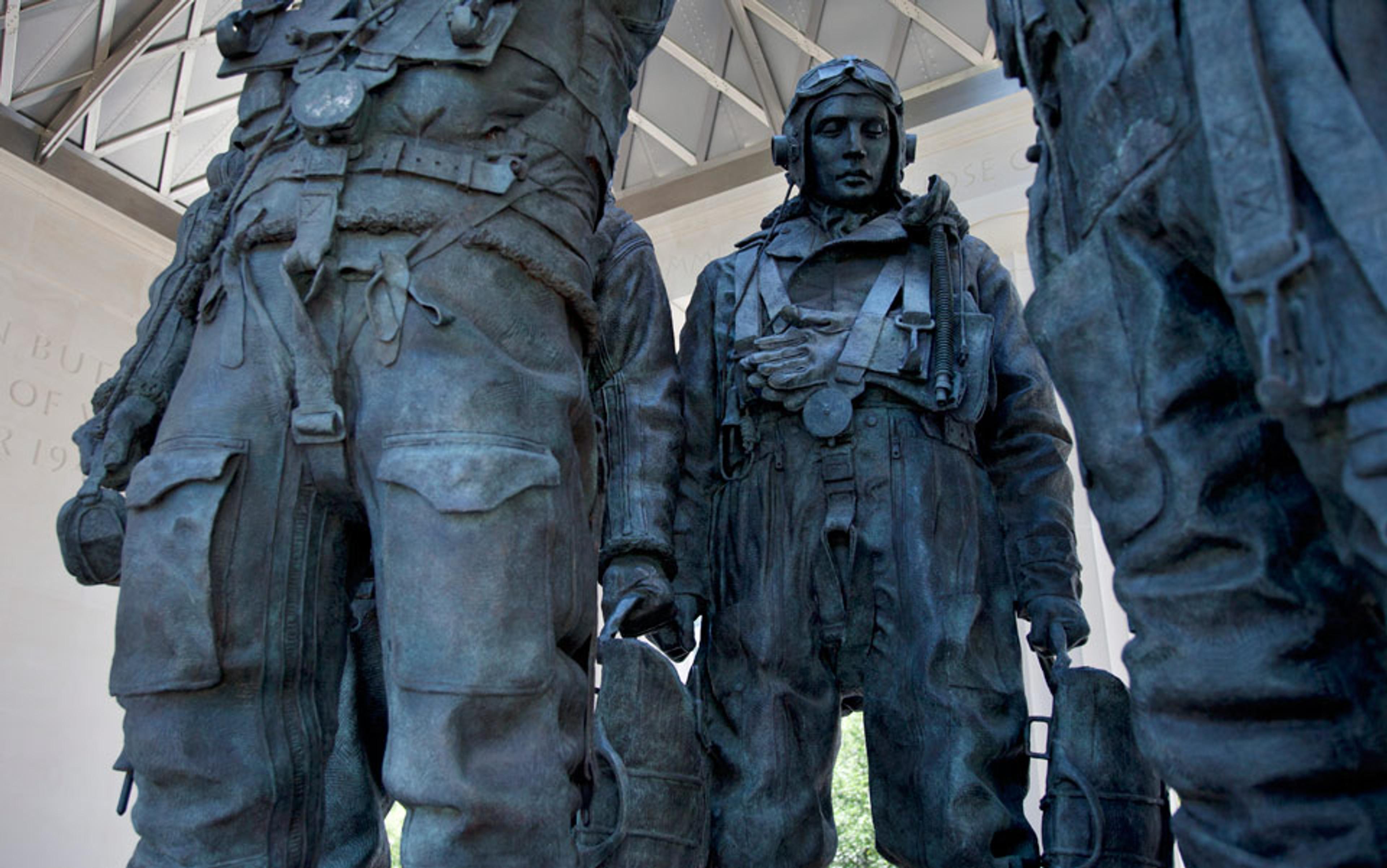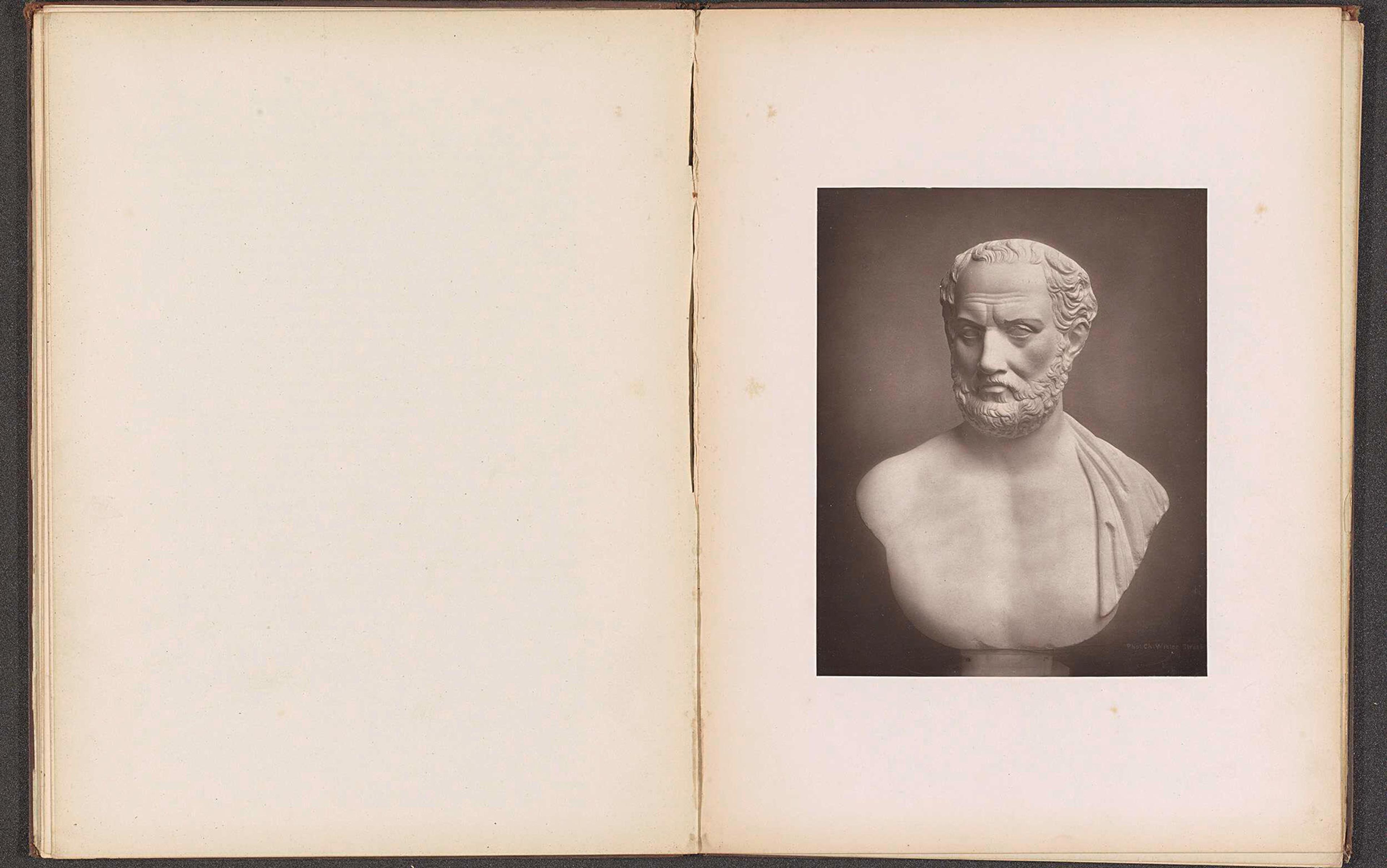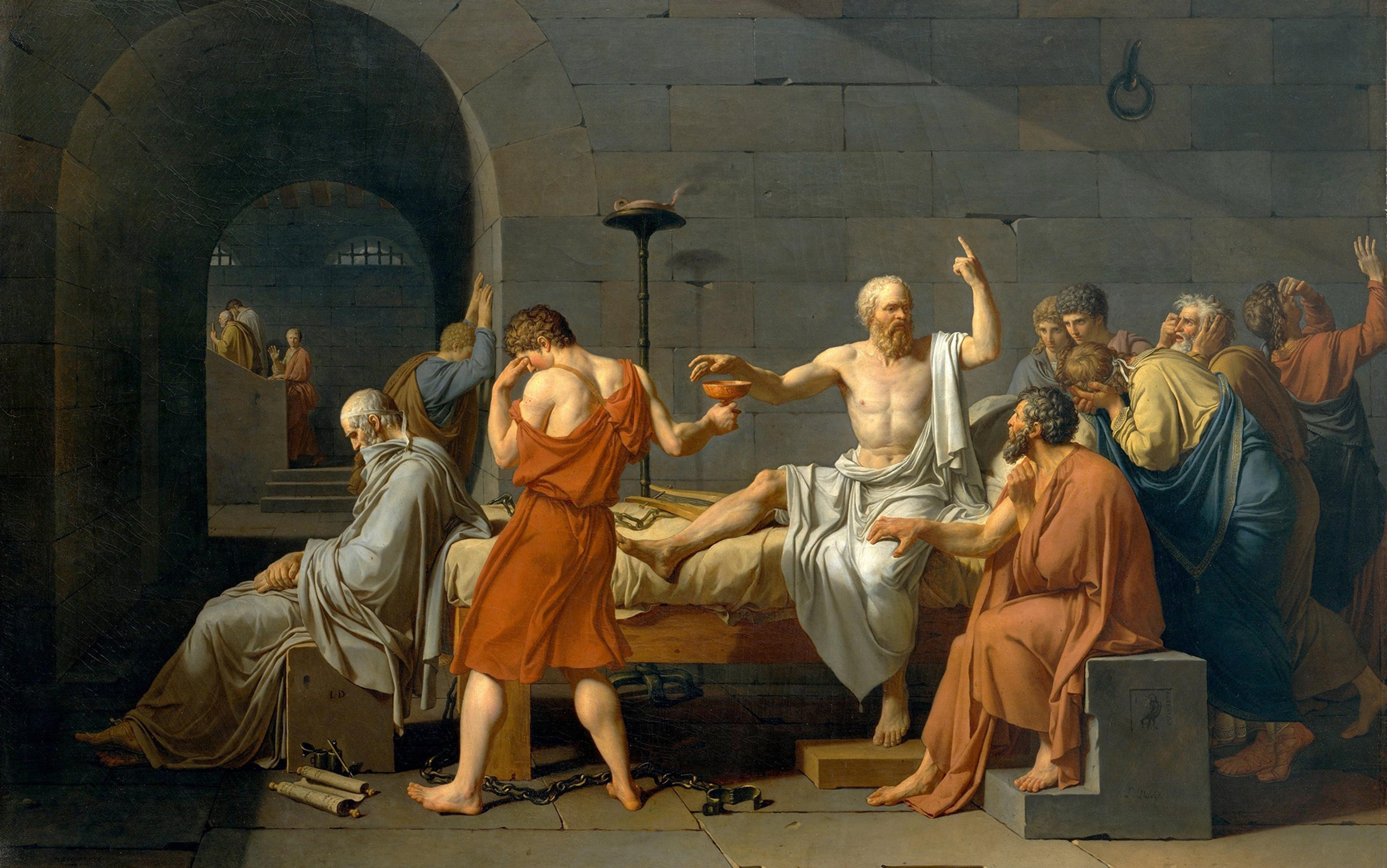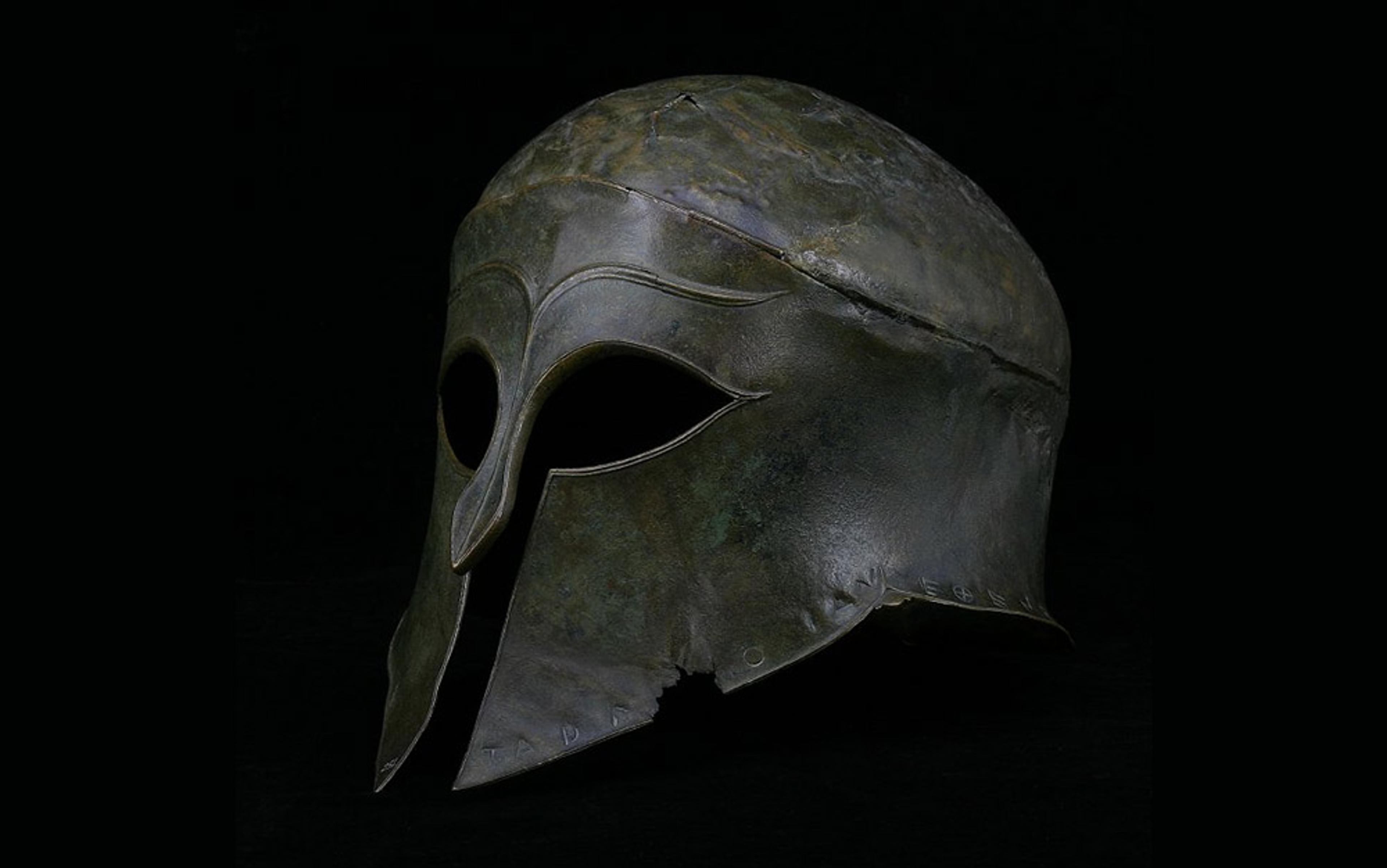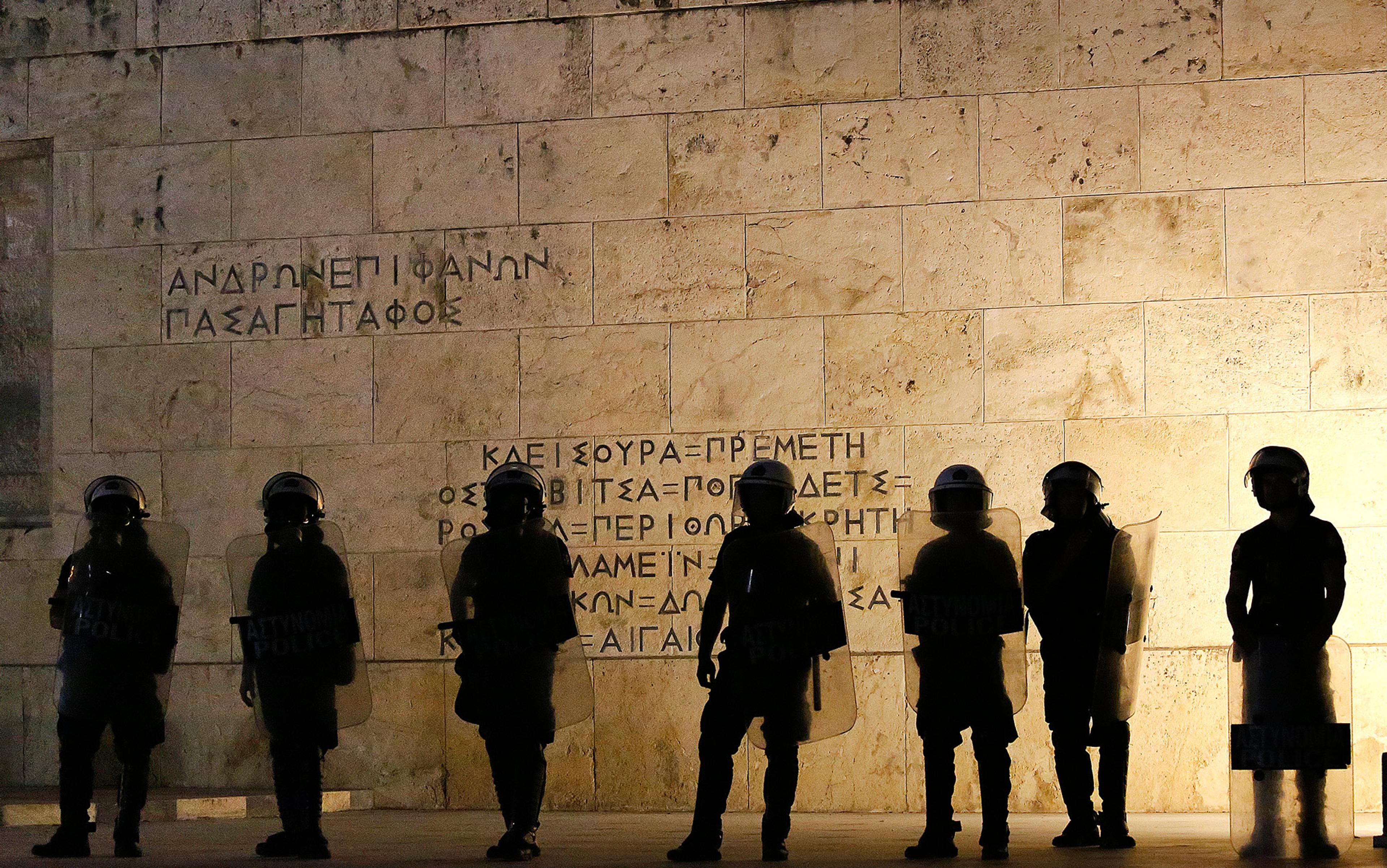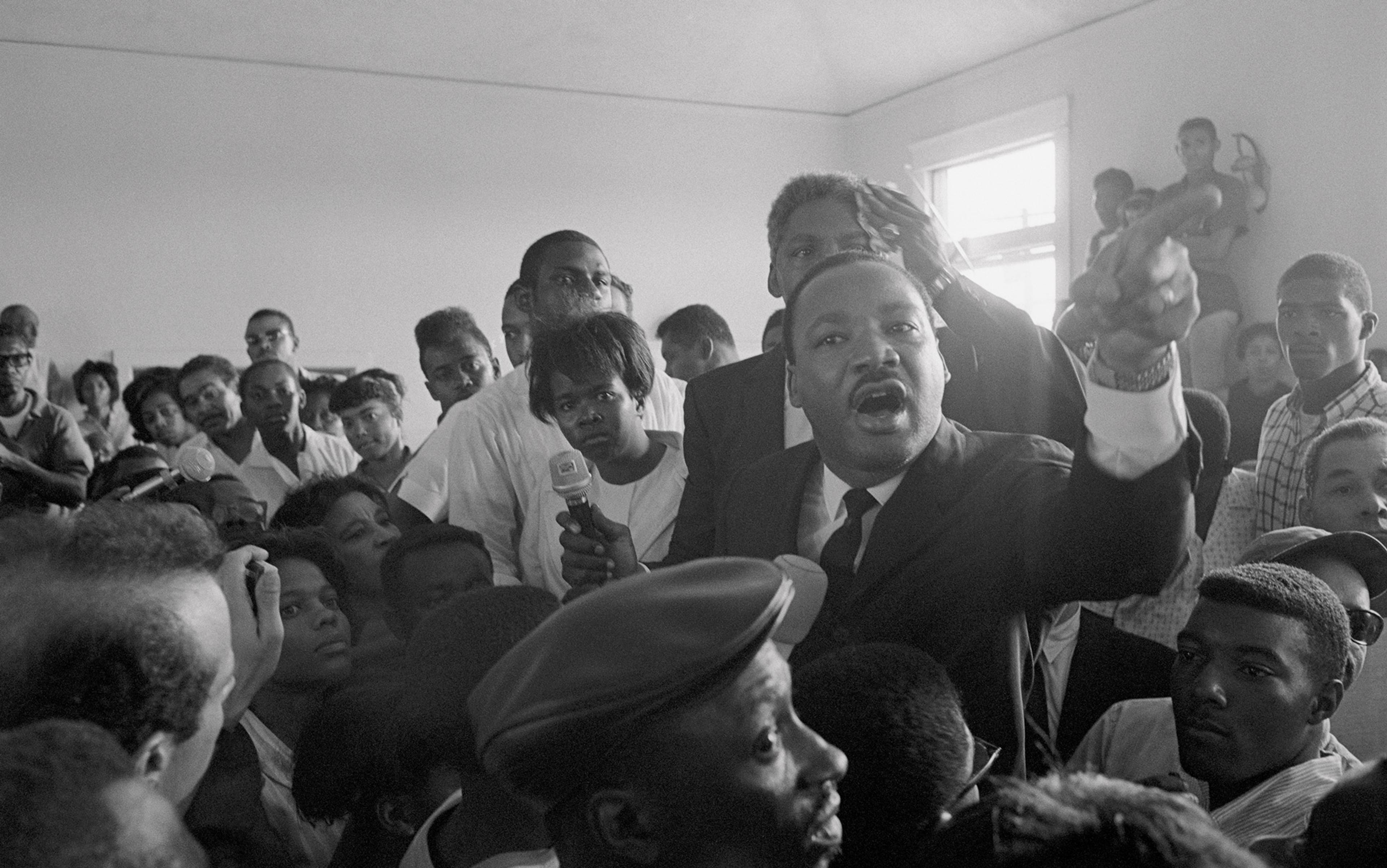When a memorial to the Royal Air Force Bomber Command opened in Green Park in London in June this year, it was greeted with a cacophony of debate. Discussions of its message and architectural merit became entangled almost immediately with a renewed dispute over the morality of Britain’s bombing campaign in Dresden during the Second World War. The fact that the memorial includes a quotation from an ancient Greek politician received, quite understandably, little attention. The architecture critic Rowan Moore was among the few who spotted it, writing in the Observer that the inscription was ‘defiant and triumphant, using quotations from Churchill and Pericles to justify the bombings’. Otherwise, the quote passed unnoticed. Or perhaps it just seemed appropriate for such a memorial, whether or not the memorial was itself appropriate.
‘Freedom is the sure possession of those alone who have the courage to defend it.’ The words on the plinth come from another memorial to the war dead: the Funeral Oration of Pericles, delivered at the end of the first year of the Peloponnesian War in 431 BCE. The year before, Sparta had provoked the Athenians, demanding that they ‘give the Greeks their freedom’ — in other words, dissolve their empire — as the price of peace. Pericles, the best speaker and the most influential man in the democracy, persuaded the Athenians that they had the resources to win any conflict, and so they refused all concessions.
The first year of war was inconclusive. Following Pericles’ strategy, the Athenians withdrew behind their city walls while the Spartans ravaged their territory. Elsewhere, there were a few skirmishes. That winter, as the contemporary historian Thucydides recounts, the Athenians gave a public funeral for those who had died. As was their custom, ‘a man chosen by the city for his intellectual gifts and general reputation’ was to make a speech in praise of the dead. It fell to Pericles, the man who had persuaded them to start the war.
Pericles’ oration was a masterpiece of rhetoric, and has been quoted and imitated ever since. In praising those who gave their lives for the city and justifying their sacrifice, it has supplied posterity with appropriate words for all such occasions of public commemoration, especially in the 20th century. The line from the Bomber Command memorial, a rather idiosyncratic translation of the original Greek, first appeared in 1924 on the Soldiers’ Tower at the University of Toronto. Over the next decade it was adopted for memorials and remembrance ceremonies across the ANZAC nations.
A line from the previous section of Pericles’ speech, ‘the whole earth is the tomb of famous men’, has proved even more popular, appearing on monuments to known and unknown soldiers from Athens to Auckland. A more accurate version of ‘Freedom is the sure possession…’ appears on the websites of numerous US veterans’ organisations: ‘Be convinced that to be happy means to be free and that to be free means to be brave.’ Sometimes it comes with the mistranslated coda ‘therefore do not take lightly the perils of war’ (Pericles actually told his audience not to worry too much about danger).
Conveniently for contemporary purposes, the oration is extremely (and deliberately) vague
Whichever version is chosen, one reason for the popularity of Pericles’ words in this context must surely be the way they serve multiple purposes. They both honour the dead and insist that such sacrifices are necessary for the defence of freedom. They even suggest that it is only those who are willing to fight for freedom who truly deserve to enjoy it, a flattering thought for the many veterans who feel undervalued by civil society. The line serves a similar function to another popular quote wrongly attributed to Thucydides (not least by the House Armed Services Committee): ‘The society that separates its scholars from its warriors will have its thinking done by cowards and its fighting done by fools.’
More insidiously, quoting Pericles presents any given conflict as a struggle for freedom from tyranny and legitimises war as the proper response. That might have been fair in the Second World War, but it is not so obviously true of the First World War. Yet that was precisely when Thucydides’ words were given this role in Britain: extracts from the Funeral Oration were printed up as pamphlets, and quotes appeared on posters on London buses. And if it was doubtful then, the support of Pericles now is even more questionable as a justification for our own overseas adventures.
One reason why the speech is so effective at selling war is that it is not solely (or even primarily) concerned with military matters. The main section is a eulogy for Athens and the qualities of its society: the things that, according to Pericles, the Athenians are fighting for, and that justify every sacrifice that might be demanded of them. As a matter of fact, it is striking how far the oration subordinates individuals to the collective good. It isn’t just the dead themselves, whose faults and virtues are rendered equally irrelevant beside their deaths in the service of the city. It is also their grieving parents, who should draw consolation from their sons’ honourable deaths and set about having more children if they are young enough, and their widows, whose greatest glory is simply not to be talked about by men, whether in praise or in blame.
These sentiments reflect a thoroughly un-modern conception of the relationship between the citizen and his community. One might suppose that, at least within the portion of the ideological spectrum that is suspicious of state power, they would raise doubts about Pericles’ political tendencies. Yet this eulogy for Athens, read as a eulogy for democracy in general, has proved enduringly popular among US politicians of both parties. Lines such as ‘our constitution is called a democracy because power is in the hands of the people’ are quoted time and again in Congress. Pericles celebrates those values — freedom, democracy, and equality — that are worth dying for, and that must be reaffirmed in times of crisis. As Congressman Major Owens put it (or rather, rapped it) in the immediate aftermath of 9/11: ‘Defiant orations of Pericles / Must now rise / Out of the ashes.’
At best, the funeral oration expresses ideals that are undermined by subsequent events. At worst, it represents the qualities that led to Athenian defeat
Conveniently for contemporary purposes, the oration is extremely (and deliberately) vague about the actual machinery of the Athenian state. Its grand statements about the power of the people, equality before the law, and emphasis on ability rather than class can be co-opted by any nation that chooses to call itself a democracy. Now, one might feel that quibbles over the original context of Pericles’ words miss the point, or that they can be dismissed as an attempt to ring-fence the ancient world as an academic monopoly. Pericles certainly did want to praise democracy (albeit his own, rather tendentious version of it). His purpose was to get his audience to support the war and accept the inevitable casualties. It is hardly inappropriate that his words should be quoted for similar ends. But the important question is whether Thucydides, our source for the oration, also endorsed its sentiments. Did he, as is often assumed, intend his readers to take Pericles’ speech at face value?
Why does this matter? Because Pericles was just a politician, but Thucydides was more than just a historian. He sought not only to record events, but to interpret and explain them; not as an end in itself, but because this would help his readers understand future events as well. His history, he claimed, would thus be a work of continuing importance and usefulness, a ‘possession for all time’. This is how it has been received, especially over the past two centuries. For many historians, Thucydides has been the model scientific historian; for theorists of international relations, he is the founder of the ‘Realist’ school, if not of the entire discipline. If Thucydides endorsed Pericles’ views, this is powerful support for the idea that war is always justifiable in defence of one’s own interests — and that imperialism, which Pericles sought to defend, is both inevitable and desirable.
The inclusion of highly polished speeches such as Pericles’ funeral oration in Thucydides’ history has often puzzled readers, especially since he claimed to disdain writing for entertainment’s sake. Some have treated them as literal transcriptions of what was actually said, although Thucydides himself contradicted this. Others have read them as statements of Thucydides’ own views. Thus, many political theorists have claimed that the famous line from the Melian dialogue, ‘the strong do what they can, and the weak suffer what they must’, is a Thucydidean doctrine, although it is said by the Athenians.
Both approaches are wrong. The speeches allowed Thucydides to explore the motives of key actors at critical moments, and to develop one of his central themes: the awkward relationship between words and deeds, ideas and reality. By juxtaposing speeches and action in his narrative, he emphasised the constant mismatch between what people thought and claimed — and what actually happened, whether because of ignorance, miscalculation, deception or chance.
So it is with Thucydides’ account of Pericles’ Funeral Oration. There is interminable debate among specialists about whether Thucydides actually admired Pericles’ leadership. It is possible to read the speech as an endorsement of Periclean ideals, but one can also see it as a deliberate exposition of the dangers in Pericles’ conception of an all-powerful Athens, with its hidden agenda of imperial expansion and the enslavement of others.
In either case, the rest of the narrative demonstrates how unsuccessful the whole project was. Having confidently started a war against Sparta, Pericles succumbs to plague within a year. Athens becomes ever more corrupt in its pursuit of dominance; this is exemplified in the amorality of the Mytilenean debate and the Melian dialogue with its ‘might is right’ argument, and in the selfish ambition of figures such as Cleon and Alcibiades. Yet it is clear that its roots lie deeper. After the disastrous invasion of Sicily, the Athenians readily abandon the glories of democracy in favour of an oligarchy, in the hope of pay from the Persians. In any case, as Thucydides had noted, democracy under Pericles was already in reality the rule of one man.
At best, then, the funeral oration expresses ideals that are inevitably undermined by subsequent events. At worst, it represents the very qualities that led to Athenian defeat. Periclean patriotism is questioned and undercut at every turn, and the reader is encouraged to weigh it carefully — or look back at it critically — rather than adopt its powerful but simple-minded slogans.
It is this emphasis on the complexity of the world and the unpredictability of events that underpins an alternative, less belligerent tradition of reading Thucydides, one that stands in opposition to the ‘Realist’ tradition of international relations. This approach sees Thucydides as offering an essentially tragic account of the world. It is echoed in modern artistic responses: John Barton’s dramatisation of Thucydides’ history as The War That Never Ends, first as a play in the 1960s (in response to Vietnam), then as a film in 1991; or Peter Handke’s agonised engagements with ‘history’ in his collection of short pieces Noch einmal für Thukydides (1995); or WH Auden’s poem ‘September 1, 1939’: ‘Exiled Thucydides knew / All that a speech can say / About Democracy, / And what dictators do…’ For such readers, the key sections of the history are not the idealistic claims about the glories of democracy or the cynical analyses of power politics, but the vivid depictions of human suffering, in the plague at Athens, the civil war at Corcyra and the Athenian retreat from Syracuse. Noble sentiments and rational calculations become shipwrecked on the realities of war and the complexities of real life — or are themselves part of the machinery that leads to disaster.
Thucydides depicted the horror and tragedy of war, and showed how society was corrupted and undermined by it. An optimistic interpretation of his intention is that he hoped to teach us to recognise such dangers and strive to avoid them. Alternatively, perhaps the idea is simply that we will learn to see the world as it is, unpredictable and uncontrollable. In either case, a quotation from Thucydides, even on a war memorial, should be the starting point for debate, and certainly not the cue for patriotic solemnities. We can take Pericles’ words at face value only if we ignore the rest of his story; and if we do that, we too risk falling under the spell of a leader who presents his military adventure as a noble defence of freedom against its sworn enemies.
